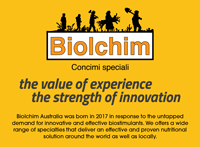L-R: AOL CEO Jackie Brian, leader of the Nationals David Littleproud and NASAA organic general manager Damien Rankine.
Never-before-seen protections for organic consumers and the promise of lucrative new export markets for producers are among the benefits of proposed legislation introduced to Federal Parliament on Wednesday.
The National Organic Standard Bill, a Private Senators’ Bill tabled by the Nationals Senator Bridget McKenzie would, if passed, make Australia the final country in the OECD (Organisation for Economic Co-operation and Development) to create a legal definition of the word “organic”.
Currently, products can be labelled and sold as “organic” in Australia with as little as one organic ingredient, leaving it to consumers to check for certification logos, hallmarks of the certified organic industry, to ensure the label claims can be trusted. Conversely, Australian organic producers selling into overseas markets must adhere to strict export standards that specify strict requirements for certified organic ingredients.
The Organic Development Group, which includes all five organic certification bodies and the two largest peak groups, Australian Organic Limited (AOL) and the National Association for Sustainable Agriculture Australia (NASAA), along with Organic and Regenerative Investment Co-operative (ORICoop) and Certified Organic Biodynamic Western Australia (COBWA), has made closing the loophole a key priority for the industry.
AOL chief executive officer, Jackie Brian, said the National Organic Standard Bill would establish a level of consumer protection that has been ‘desperately needed’.
“We know from survey data that consumers are being misled by labels that make unverified organic claims, which is unfair to those buyers and unfair to the producers who go through the lengthy and rigorous process of attaining organic certification,” Brian said.
“It has been a loophole we have been calling to be closed for a long time, and we hope to work with all sides of politics to set the standard for consumers in Australia that is the norm for so many countries around the world.”
NASAA general manager, Damien Rankine, said if the Bill was passed the competition watchdog, the Australian Competition and Consumer Commission (ACCC), would have clear guidelines to ensure consumers were getting what they paid for.
“The ACCC currently has unclear definitions relating to the use of the term organic in Australia, with no specific requirements to meet a particular standard or to be certified, which creates confusion and erodes the trust our industry has worked hard to establish,” Rankine said. “This Bill would provide a clear set of rules, and they could be established quickly and simply.”
Organic consumer and Hervey Bay nutritionist, Ashleigh Kelly, said she found the current labelling situation frustrating.
“As consumers, we are lugged with having to navigate what is or isn’t truly organic,” Kelly said.
“Clear regulations and a quick way to identify organic products would take the guesswork out of the equation.”
It was a sentiment echoed by passionate organic consumer and mother of two, Amanda Barns.
“Organic logos let me shop with confidence, knowing the products are certified and that I’m getting something that’s better for my family and the planet,” Barns said.
“Closing this loophole that allows products that are not truly organic to be labelled organic is a no-brainer.”
Brian said regulating a domestic standard for organic production and labelling would not just be a benefit to consumers but would also help unlock new export markets.
“The organic industry has experienced strong growth for the past 20 years, but to really unlock future benefits we need to address the key barrier of market access,” she said.
“Many countries, including key trading partners such as South Korea and the United States, do not recognise our export standard and require producers to get additional certification, which can be a complex and costly process. Some producers are having to do this in multiple jurisdictions.
“If Australia had domestic regulation, it would help our government negotiate equivalency arrangements with other nations meaning producers would only need to attain one certification, the National Organic Standard established by this Bill, cutting red tape and stimulating export growth.”
“We encourage anyone who has an interest in organics to support this Bill and play a part in establishing a mandatory National Standard.”
Members of the Organic Development Group:
- ACO Certification Limited (ACO)
- Australian Organic Limited (AOL)
- Bio-Dynamic Research Institute (BDRI)
- Certified Organic Biodynamic Western Australia (COBWA)
- National Association for Sustainable Agriculture Australia (NASAA)
- NASAA Certified Organic (NCO)
- Organic and Regenerative Investment Co-operative (ORICoop)
- Organic Food Chain (OFC)
- Southern Cross Certified (SXC)
Are you a Daily Wine News subscriber? If not, click here to join our mailing list. It’s free!





















